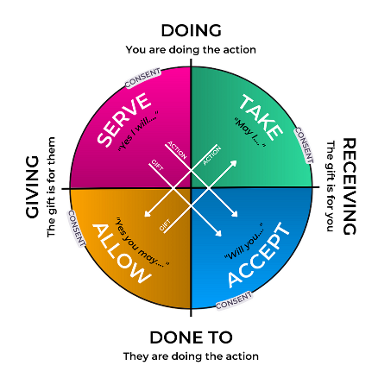
“Your ‘yes’ means nothing if you can’t say ‘no’.” Do you agree?
Consider this: “If you can share a ‘no,’ I can trust your ‘yes.’” Read it twice. It is a very powerful statement.
Many of us, especially within Asian cultures, often struggle with saying “no” to others. This can create a sense of obligation to fulfil requests and meet expectations, even when unfavourable! This phenomenon is particularly pronounced in individuals with a People-Pleaser personality trait.
Another group of individuals who generally fear saying “no” are those who have experienced traumatic incidents or events during childhood or their formative years. Meeting the demands of others can become a self-protection mechanism. Instead of the typical fight or flight reactions, they may choose to freeze or fawn. Freeze means becoming immobilised or unable to act in response to stress or fear, often as an automatic reaction to feeling overwhelmed or threatened. The latter, fawn is a disposition in excessively trying to please others and avoid conflict as a way to manage stress or fear, often at the expense of one’s own needs and boundaries.
Such an adverse reaction could also occur in a romantic relationship. Here is a story of an ex-client of mine.
A Deep Cry
As an Intimacy and Sexual Wellness Therapist, I often assist individuals who have experienced sexual abuse to find their voice and learn to say “no”.
One of my cisgender male clients, Mr Y, in his early 20s, approached me for help with his difficulty in refusing his first girlfriend’s intimate advances, during their courtship period. While this situation might seem unusual to some, Mr Y’s struggle was being emotionally trapped in that traumatic moment when everything changed.
At the age of 17, while working as a part-time home tutor at a student’s house, he was once molested by a senior female family member of the student. This past trauma had a profound impact on this ability to assert his boundaries in intimate situations.
Mr Y was able to share such a painful experience with me after we had established a strong therapeutic alliance based on a non-judgmental environment and trust. He knew that he needed to process this traumatic episode in his life in order to move forward and engage fully in a romantic relationship with his girlfriend.
Despite loving his girlfriend wholeheartedly, Mr Y would recall the distressing incident whenever she initiated intimacy, leading him to frantically excuse himself. Mr Y’s reluctance created significant tension in the relationship.
Donna Freitas commented in Consent: A Memoir of Unwanted Attention that, “But is there such a thing as trauma without shame? Isn’t shame an integral part of what causes an event or series of events to become a trauma?” This depicts Mr Y’s valid reservations about telling his girlfriend the truth, fearing she might look down on him for not being able to protect himself as a man during the sexual assault, or worse, think he was making up the story.
Boundary and Consent
During the course of therapy, in addition to the essential interventions and treatments for processing Mr Y’s sexual trauma, we spent significant time, energy and resources to psychoeducation. We focused on how to cultivate self-respect through effective boundary setting and mutual consent, which are crucial for enhancing overall well-being in various aspects of life, including intimacy and sexual wellness. These practices are universally applicable, regardless of gender identity, gender expression, sexual orientation, or gender role.
Mr Y was guided in setting healthy and balanced boundaries, including physical, emotional, and sexual boundaries. We explored the concept of sexual boundaries, which encompass an individual’s comfort level with sexual activities, consent, and communication about desires and limits.
Consent is fundamental in establishing boundaries and fostering communication, trust, and respect within healthy sexual relationships. It remains crucial in marriage or committed relationships, it is important to remember that being in a relationship does not automatically imply consent for any sexual activity. Each person retains the right to give or withhold consent at any time.
With this understanding, I introduced Mr Y to the concept of “Enthusiastic Consent“ from Dr Betty Martin‘sWheel of Consent.
The Wheel of Consent serves as a practical framework that clarifies and addresses unhealthy or confusing dynamics in our interactions. It offers a clear guide to understanding our needs, wants, and desires. It helps us overcome tendencies to please others, set healthy boundaries, develop self-trust and integrity, and foster more enriching and fulfilling relationships.
Enthusiastic Consent is an affirmative and outwardly expression of willingness to engage in sexual activity, as supported by Valentine Glass in The Temptation in Eden, “Anything from you that is less than enthusiastic consent is a no, at least until we agree otherwise.”
The 3-Minute Game
To address Mr Y’s sexual trauma and his ongoing intimacy and sexual concerns with his girlfriend, a progressive therapy plan was implemented. One of the key components of this plan was “The 3-Minute Game” from Dr Betty Martin’s Wheel of Consent (see diagram below), which he was encouraged to practice with his girlfriend. The therapeutic goal was to help him master boundary setting and achieve mutual consent in their relationship.

Utilising the 4 Quadrants of the Wheel of Consent, Mr Y was trained to apply these concepts through a scenario we both created together.
The 3-Minute Game consists of four phases, each lasting three minutes:
- The First Phase: “I do to you” (Serving): When I am doing an action that you have asked for. For example, when Mr Y hugged his girlfriend as she requested.
- The Second Phase: “You do to me” (Accepting): When I am receiving an action that I have asked for. For example, when Mr Y wanted his girlfriend to hug him in the way he desired.
- The Third Phase: “I do to you, for me” (Taking): When I am doing an action to you within your limits, for my own pleasure. For example, when Mr Y hugged his girlfriend in the way he wanted, and she did not object.
- The Fourth Phase: “You do to me, for you” (Allowing): When I am being done to within my limits, for your pleasure. For example, when Mr Y let his girlfriend to hug him in a way he found acceptable.
It was challenging for Mr Y to implement these new practices in his romantic relationship, as he had been avoiding intimacy for years due to his past trauma. However, he took the initiative to lower the challenge level, such as holding hands, placing a hand on his girlfriend’s lap, or a peck on the cheek. With much practice and time, his confidence and trust in himself and his girlfriend, their romantic relationship grew, leading to more fulfilling and positive experiences.
As Shannon L. Alder stated, “No boundary or barrier surrounds the heart of a person that loves their self and others.” The benefits of these practices extended beyond Mr Y’s romantic relationship, aiding in his healing from sexual trauma and improving his relationships with family members, friends and colleagues.
Then one day, Mr Y shared that his intimacy and sexual wellness with his girlfriend had improved tremendously and that his quality of life had become much more balanced. It was clear that our course of therapy was nearing its end. A couple of weeks later, when I suggested scheduling an additional therapy session, he confidently responded with a firm “No.” At that moment, I knew my services were no longer needed, and I could not help but smile, knowing he was ready to move forward on his own.
“No” is a complete sentence.
Annie Lamott
Note: This article is designed for general readers, so the case conceptualisation, intervention strategies, and discussions have been simplified for easy reading, comprehension, and relevance. Additionally, the profiles, backgrounds, and demographics of the individuals mentioned have been modified to protect their identities.
Krish Phua is available for a Free 15-Minute Virtual Intro Consultation, please book here.
References:
- Adam. (2023, May 19). What is the Wheel of Consent? – Adam – Medium. Medium. https://medium.com/@adamwilder/image-of-2-people-what-is-the-wheel-of-consent-5c6803068733
- Admin. (2019, January 10). Boundaries: Your yes means nothing if you can’t say no. Neha Sangwan, MD – Intuitive Intelligence. https://intuitiveintelligenceinc.com/boundaries-your-yes-means-nothing-if-you-cant-say-no/
- A quote from Consent. (n.d.). https://www.goodreads.com/quotes/10138499-but-is-there-such-a-thing-as-trauma-without-shame
- A quote by Shannon L. Alder. (n.d.). https://www.goodreads.com/quotes/1276633-no-boundary-or-barrier-surrounds-the-heart-of-a-person
- A quote from The Temptation of Eden. (n.d.). https://www.goodreads.com/quotes/11453856-anything-from-you-that-is-less-than-enthusiastic-consent-is
- A quote by Anne Lamott. (n.d.). https://www.goodreads.com/quotes/24553-no-is-a-complete-sentence
- The Wheel of Consent – Betty Martin. (n.d.). https://bettymartin.org/videos/
- Top 40 Meshell Ndegeocello Quotes (2024 update). Quotefancy. (n.d.). https://quotefancy.com/meshell-ndegeocello-quotes
About Krish Phua

Krish Phua is a registered Counsellor, Psychotherapist, and certified Clinical Supervisor specializing in Gender and Sexuality, HIV and AIDS, and Couple and Family Therapy. With over 10 years of experience in various settings, Phua provides therapy for individuals, couples, families, and groups. He also offers crisis management, intervention, and psychosocial support to marginalized communities.
Phua holds a Master’s degree in Social Science (Professional Counselling) and is currently pursuing a PhD in Counselling Psychology. He is also an adjunct faculty / lecturer and a trainer in some educational institutions for adult learners. He is fluent in English, Chinese, and Cantonese.
